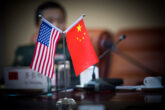March 27, 2017
Taiwan’s Answer to Chinese Economic Coercion
A Japanese vice minister has become the highest-ranking Japanese official to visit Taiwan since Tokyo severed ties with the island in 1972. Jiro Akama, deputy minister of internal affairs and communications, opened a tourism fair and urged Taipei to relax the restrictions on food imports put in place after the Fukushima nuclear disaster.
Such mundane diplomacy would register barely a blip in any normal international relationship, but it represents a minor Taiwanese victory in the highly charged cross-strait relations between Taipei and Beijing. To the extent that it helps boost Japan’s economic ties with the island, it’s also an example for the region and beyond.
China today is subjecting Taiwan to its trademark economic coercion. Following Tsai Ing-wen’s 2016 election to Taiwan’s presidency after eight years of Kuomintang rule, Beijing dialed up the pressure. Its immediate demand is that Ms. Tsai endorse the “1992 Consensus,” an agreement that there exists one China (even as Taiwan and China differ on its meaning).
Read the full article at the Wall Street Journal.
More from CNAS
-
“The Ayatollah Has No Clothes” – with Rich Goldberg and Richard Fontaine
Richard Fontaine is CEO of the Center for American Security, joins Call Me Back to assess the threat FROM Iran and the threat TO Iran. Listen to the full episode on Call Me ...
By Richard Fontaine
-
Lost Decade - The U.S. Pivot to Asia and the Rise of Chinese Power with Richard Fontaine
Richard Fontaine, CEO of the Center for a New American Security, joins Coffee & Conflict to discuss his book The U.S. Pivot to Asia and the Rise of Chinese Power. He dives int...
By Richard Fontaine
-
Sharper: Allies and Partners
Amid intensifying geopolitical challenges, the United States is finding new ways to address security issues by cultivating and strengthening alliances and partnerships. How ca...
By Gwendolyn Nowaczyk & Charles Horn
-
What Can the US Expect From Sri Lanka’s New President?
Washington views Sri Lanka as a “lynchpin” of its Indo-Pacific strategy and seeks a partner committed to strengthening the democratic process and economic governance while pro...
By Keerthi Martyn




